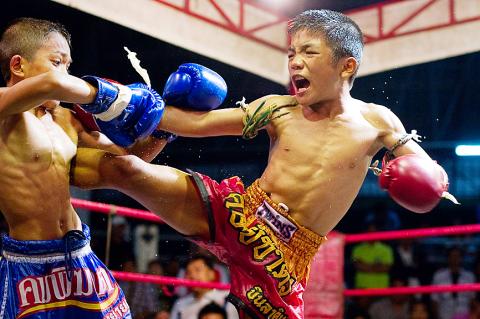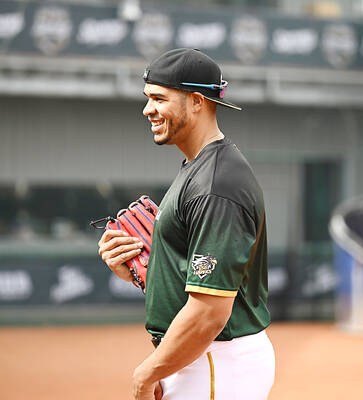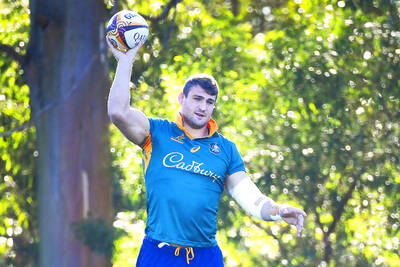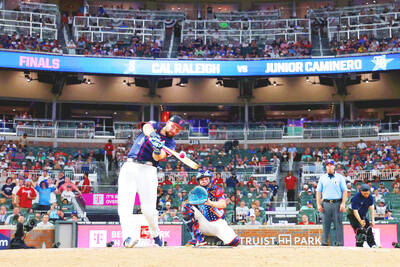Thousands of child boxers compete in Thailand’s traditional martial art with dreams of belts, glory and prize money — but the death of a 13-year-old has lit up a sensitive debate over whether competitors start too young.
Centuries-old Muay Thai — known as the art of eight limbs for the different ways opponents can strike each other with knees, fists, kicks and elbows — is the country’s de facto national sport and remains a source of immense pride.
However, new research has suggested that the earlier Muay Thai boxers begin, the more prone they are to a range of injuries.

Photo: AFP
Lawmakers under the country’s military leadership have also drafted revamped legislation that would bar children younger than 12 from competing in the contact sport.
The push has gathered new momentum after the death of 13-year-old Anucha Tasako, who died from a brain hemorrhage after his similarly aged opponent struck him with multiple blows to the head at a charity fight near Bangkok on Saturday last week.
Anger erupted on social media, where footage of the critical moments of the bout was uploaded.
Thai Deputy Prime Minister Prawit Wongsuwan instructed the Thai Ministry of Tourism and Sports to review the legislation, which also requires parental consent for those aged between 12 and 15 and “physical safety measures.”
“The competitions must have appropriate, protective gear from the arena manager,” a spokesperson cited Prawit as saying.
It is common for Muay Thai fighters to start young and Anucha embarked on his career when he was eight years old.
He grew up in the northeastern Kalasin Province and after his parents parted ways, he spent time with a relative who had a Muay Thai gym.
Gripped by the sport, Anucha moved to Bangkok to stay with an uncle and train.
By the time he got to the charity match in Samut Prakan Province on Saturday, he had fought 170 times, local media reported.
Critics have pointed to alleged child exploitation, as gamblers bet on bouts or promoters shave off prize money.
However, it is the unseen health consequences that have received the most attention.
A five-year study from 2012 by the Child Safety Promotion and Injury Prevention Center at Ramathibodi Hospital in Bangkok carried out magnetic resonance imaging scans on the brains of 335 child boxers and compared them with 252 non-boxers of the same ages.
It was “clear” that child boxers suffered more brain cell damage and ruptures and also had lower IQs, hospital director Adisak Plitponkarnpim said.
“Their young age increases the damage, because their skull and muscles are not yet fully developed,” he said.
Accumulative injuries could put them at higher risk for Alzheimer’s and Parkinson’s diseases as adults, he added.
Coaches, gym owners and older fighters have mixed feelings about the draft legislation.
Thailand’s champions who have climbed out of Muay Thai and into success in Western boxing circles also honed their skills as youngsters.
Wanheng Menayothin, the World Boxing Council mini-flyweight champion who surpassed US boxer Floyd Mayweather Jr’s 50-0 record this year, moved to Bangkok at age 12 to train.
Tawee Umpornmaha also started fighting at 12 and went on to win silver at the 1984 Summer Olympics.
Some also feel that the discussion about Muay Thai unfairly stigmatizes a sport that is easier to access for the Southeast Asian nation’s impoverished youth than more expensive sports such as golf or tennis.
“For a lot of children, Muay Thai is a path out of poverty,” said a Muay Thai gym owner, who did not want to be named because of the sensitivity of the issue.
Besides giving children a sense of purpose, the owner said it also offers them “the chance to dream of a future far beyond the sport.”
The tensions are embodied in Anucha’s coach, Somsak Deerujijaroen, who runs a gym.
“If the laws fully prevent child boxing, Thailand will not have Muay Thai masters. It will be the end of it. We will pass on the championships to foreigners,” he said at the funeral for Anucha, adding that rules on protective headgear for youth made more sense.
However, he feels conflicted after the incident and blames himself.
“I don’t want to do the boxing gym anymore,” he said. “One of my own kids, who is eight years old, has also been trained, but after this, I don’t want him to do it anymore.”

Tainan TSG Hawks slugger Steven Moya, who is leading the CPBL in home runs, has withdrawn from this weekend’s All-Star Game after the unexpected death of his wife. Moya’s wife began feeling severely unwell aboard a plane that landed at Taiwan Taoyuan International Airport on Friday evening. She was rushed to a hospital, but passed away, the Hawks said in a statement yesterday. The franchise is assisting Moya with funeral arrangements and hopes fans who were looking forward to seeing him at the All-Star Game can understand his decision to withdraw. According to Landseed Medical Clinic, whose staff attempted to save Moya’s wife,

Wallabies coach Joe Schmidt yesterday backed Nick Champion de Crespigny to be the team’s “roving scavenger” after handing him a shock debut in the opening Test against the British and Irish Lions Test in Brisbane. Hard man Champion de Crespigny, who spent three seasons at French side Castres before moving to the Western Force this year, is to get his chance tomorrow with first-choice blindside flanker Rob Valetini not fully fit. His elevation is an eye-opener, preferred to Tom Hooper, but Schmidt said he had no doubt about his abilities. “I keep an eye on the Top 14 having coached there many years

ON A KNEE: In the MLB’s equivalent of soccer’s penalty-kicks shoot-out, the game was decided by three batters from each side taking three swings each off coaches Kyle Schwarber was nervous. He had played in Game 7 of the MLB World Series and homered for the US in the World Baseball Classic (WBC), but he had never walked up to the plate in an All-Star Game swing-off. No one had. “That’s kind of like the baseball version of a shoot-out,” Schwarber said after homering on all three of his swings, going down to his left knee on the final one, to overcome a two-homer deficit. That held up when Jonathan Aranda fell short on the American League’s final three swings, giving the National League a 4-3 swing-off win after

Seattle’s Cal Raleigh defeated Tampa Bay’s Junior Caminero 18-15 in Monday’s final to become the first catcher to win the Major League Baseball Home Run Derby. The 28-year-old switch-hitter, who leads MLB with 38 homers this season, won US$1 million by capturing the special event for sluggers at Atlanta’s Truist Park ahead of yesterday’s MLB All-Star Game. “It means the world,” Raleigh said. “I could have hit zero home runs and had just as much fun. I just can’t believe I won. It’s unbelievable.” Raleigh, who advanced from the first round by less than 25mm on a longest homer tiebreaker, had his father